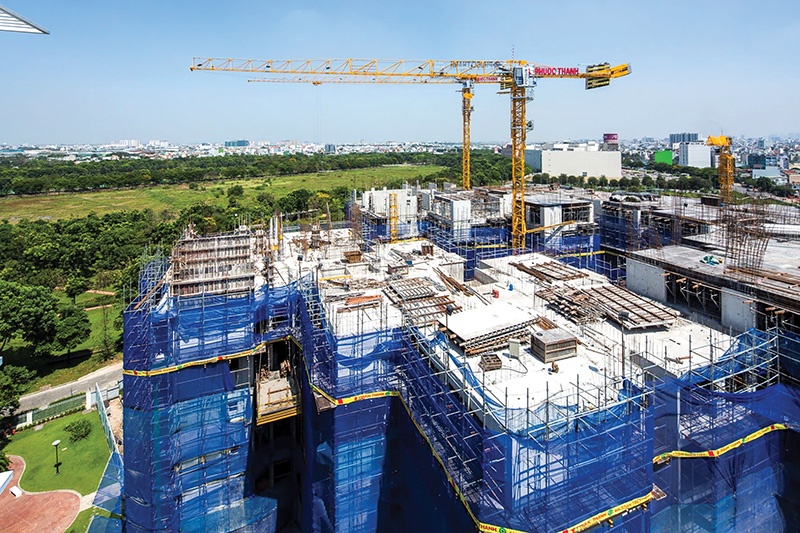Construction reboot a welcome step
 |
| After more than four months, Ho Chi Minh City allowed construction works to resume from October 1. Photo: Le Toan |
The construction of over 20 major projects in the city has resumed after being suspended since the worst outbreak of COVID-19 began. Luong Minh Phuc, director of Ho Chi Minh City Management Board for Traffic Works Construction and Investment, said the projects would restart from October 1 and are required to meet pandemic prevention and control safety requirements.
Many of these major projects are required to be completed before the end of the year, such as infrastructure in the Nuoc Den canal area in Binh Tan district, the new Hang Ngoai Bridge in Go Vap district, Thanh Da Park in Binh Thanh district, and more besides.
The summer months have severely dented the plans of developers. According to Nguyen Huong, CEO of Dai Phuc Land, the application of government directives during social distancing had a severe impact on the delivery process of products to customers as soon as the construction bans were put in place.
“All stakeholders such as developers, contractors, and buyers should negotiate conditions for the proper continuation of construction,” Huong said. “This issue needs the understanding and sympathy from all sides, to share the risk and support each other to overcome this difficult time.”
However, in addition to causing severe effects for developers, the delays caused a domino effect on contractors and sub-contractors of projects, including buyers.
Meanwhile, according to a representative from Gamuda Land in Ho Chi Minh City, the government’s decision to apply stringent pandemic prevention and control measures, while ensuring the safety of the people, seriously affected the project implementation progress of developers such as Gamuda Land. The supply chain of goods and materials was interrupted and administrative procedures were kept pending.
“For instance, the next precinct of the Celadon City township project has had to suspend construction activities many times since March 2020, costing about five months in total,” the source told VIR.
Ngo Quang Phuc, general director of Phu Dong Group, said that developers are now lacking workers because many have travelled back to their hometowns and have not yet returned to the city. “Developers, in addition, are unable to collect instalment payments from buyers due to the delayed projects,” Phuc said.
Buyers, meanwhile, have not been so upended by delays because they have also been facing difficulties in mobilising cash for payments.
Nguyen Minh Van, a resident in Thu Duc city of Ho Chi Minh City, was one buyer whose unit was left behind in the handover schedule.
“The pandemic forces developers to delay their progress of unit delivery, but on the other hand, it also gives buyers more time for arranging their cash to pay instalments for the next phases,” Van said.
Nguyen Hoang, director of Research and Development of DKRA Vietnam, said that in addition to venture delays, real estate developers are now also burdened with an increase in construction material prices and transportation costs.
The Ho Chi Minh City Real Estate Association in August proposed that the government consider supporting packages on taxes and land rental fees, as well as supporting policies from the bank in terms of deferring payment deadlines for 3-month interest loans, giving a new payment term after each quarter, and providing interest-free loans for businesses and home buyers.
In the capital of Hanoi, the city People’s Committee allowed construction works to resume from September 22, except for those located in locked-down areas.
However, local district people’s committees are being asked to report on the pandemic prevention and control situation on a daily basis to Hanoi Department of Construction.
What the stars mean:
★ Poor ★ ★ Promising ★★★ Good ★★★★ Very good ★★★★★ Exceptional
Related Contents
Latest News
More News
- An Phat 5 Industrial Park targets ESG-driven investors in Hai Phong (January 26, 2026 | 08:30)
- Decree opens incentives for green urban development (January 24, 2026 | 11:18)
- Public investment is reshaping real estate’s role in Vietnam (January 21, 2026 | 10:04)
- Ho Chi Minh City seeks investor to revive Binh Quoi–Thanh Da project (January 19, 2026 | 11:58)
- Sun Group launches construction of Rach Chiec sports complex (January 16, 2026 | 16:17)
- CEO Group breaks ground on first industrial park in Haiphong Free Trade Zone (January 15, 2026 | 15:47)
- BRIGHTPARK Entertainment Complex opens in Ninh Binh (January 12, 2026 | 14:27)
- Ho Chi Minh City's industrial parks top $5.3 billion investment in 2025 (January 06, 2026 | 08:38)
- Why Vietnam must build a global strategy for its construction industry (December 31, 2025 | 18:57)
- Housing operations must be effective (December 29, 2025 | 10:00)

 Tag:
Tag:




















 Mobile Version
Mobile Version